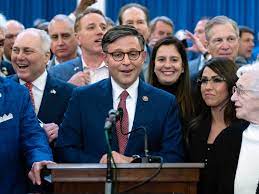Speaker Johnson Must Learn to Compromise, Senate Democrats Urge

In a political climate where partisanship often stalls legislative progress, Senate Democrats are calling on Speaker Johnson to embrace the art of compromise. In recent weeks, debates have intensified on the Senate floor with various bills finding themselves in a deadlock due to uncompromising positions from different parties.
Speaker Johnson, who ascended to his role with promises of change and proactive governance, has been under increasing pressure to find middle ground on key issues that are crucial for the nation’s forward movement. The Senate Democrats’ urging comes as critical legislation regarding healthcare, environmental protection, and economic reform hangs in the balance.
The art of compromise is a cornerstone of democratic governance and something that past Speakers have had to navigate with care. It involves giving and taking, understanding the priorities of the opposition, and reaching a conclusion that, while not perfect for all, moves in the direction of collective benefit.
However, Speaker Johnson’s tenure has so far been marked by a strong adherence to the agenda set forth by his party, which has resulted in several standoffs. His approach is often seen as myopic by his critics who argue that it neglects the diverse opinions and needs within the chamber.
Experts suggest that learning to compromise does not mean abandoning one’s principles but rather finding a path that respects the principles of others as well. It’s about building bridges and creating policies that can win support across the aisle.
The call for compromise is not just from within government ranks but also resonates with the public. Citizens express growing frustration over impasses that lead to government shutdowns and delayed services. They want action and solutions that reflect a collective vision for society rather than a single-minded direction.
Senate Democrats believe that if Speaker Johnson adjusts his strategy towards more collaborative efforts, it would pave the way for more effective governance. This shift could translate into tangible outcomes from bipartisan work on infrastructure projects to comprehensive immigration reform.
As America grapples with domestic challenges and international obligations, there is an undeniable need for strong leadership combined with an ability to adapt through compromise. This sentiment echoed by Senate Democrats is more than a political maneuver; it is an appeal for unity and functionality within one of the country’s most revered institutional pillars.
The coming months will prove pivotal as Speaker Johnson decides whether to heed this call for compromise or continue forth on his current legislative trajectory. The nation watches closely as decisions made today will undoubtedly shape its tomorrow.






